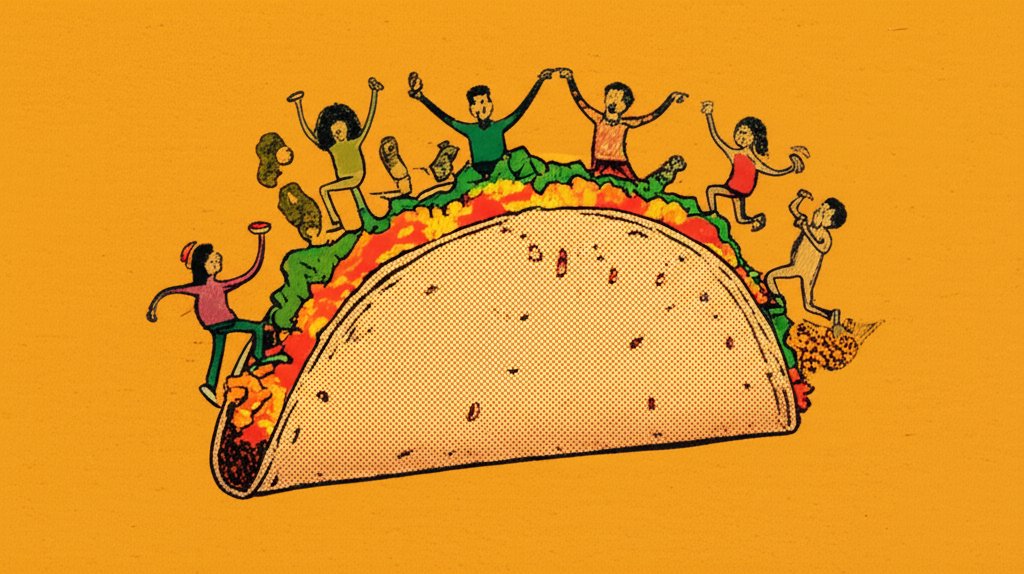Craving a late-night snack? Jack in the Box tacos are a popular choice, but understanding the nutrition facts for Jack in the Box tacos is key to making informed decisions. Let’s dive into what you’re really eating, beyond the delicious crunch.
At a glance:
- A single Jack in the Box beef taco contains roughly 190 calories.
- Fat and carbohydrates make up the majority of those calories.
- Sodium levels can be significant, especially if you’re eating multiple tacos or the Monster varieties.
- Consider the potential allergens (soy, milk, and wheat) if you have sensitivities.
- Moderation is key if you’re watching your calorie intake or following a specific diet.
The Anatomy of a Jack in the Box Taco: A Calorie Breakdown
The standard Jack in the Box beef taco packs around 190 calories. Here’s a closer look at where those calories come from:
- Fat: Approximately 11 grams, contributing around 52% of the total calories.
- Carbohydrates: Around 17 grams, accounting for about 35% of the total calories.
- Protein: A smaller portion, contributing the remaining calories.
To put that into perspective, burning off the calories from just one taco requires roughly 17 minutes of running or 27 minutes of walking.
Beyond the Beef: Examining the Taco’s Ingredients
While the calorie count is important, the ingredients themselves also warrant consideration. Jack in the Box tacos typically contain:
- Seasoned beef
- American cheese
- Shredded lettuce
- Taco sauce
- A crispy, deep-fried taco shell
It’s worth noting that the preparation method (deep-frying) significantly impacts the fat content.
Regular vs. Monster: Comparing Taco Varieties
Jack in the Box offers several taco variations, with the “Monster Taco” being a larger, more indulgent option. Here’s a comparison of the nutritional information:
| Nutrient | Regular Taco (1) | Monster Taco (1) |
|---|---|---|
| Calories | 190 | 267 |
| Total Fat | 11g | 17g |
| Saturated Fat | N/A | 6g |
| Trans Fat | N/A | 1g |
| Cholesterol | N/A | 23mg |
| Sodium | N/A | 625mg |
| Carbohydrates | 17g | 19g |
| Fiber | N/A | 2g |
| Sugars | N/A | 1g |
| Protein | N/A | 9g |
| As you can see, the Monster Taco packs a significantly higher calorie and fat punch due to its increased size and potentially different ingredients. Other variations like the Nacho Monster Taco offer a similar but modified caloric and fat count. |
Sodium Sensitivities: A Word of Caution
One area of concern with Jack in the Box tacos, particularly the Monster varieties, is the sodium content. A single Monster Taco can contain over 600mg of sodium. The Nacho Monster Taco contains upwards of 900mg of sodium. Consuming multiple tacos can quickly lead to exceeding the recommended daily sodium intake, which is crucial to understand before ordering your meal.
Excessive sodium intake can contribute to high blood pressure and other health issues, so it’s important to be mindful of your sodium consumption, especially if you’re sensitive to salt.
Allergens to Watch Out For
If you have food allergies or sensitivities, be aware that Jack in the Box tacos contain:
- Soy
- Milk
- Wheat
These allergens are present in various components of the taco, including the shell, meat seasoning, and cheese. Always review the ingredient list and allergen information provided by Jack in the Box if you have concerns.
Tacos and Weight Watchers: Points to Consider

For those following the Weight Watchers program, a single Jack in the Box beef taco equates to 6 Freestyle Points, 6 SmartPoints, and 5 PointsPlus. Keep this in mind when tracking your points for the day. Spaghetti and Meatballs Nutrition Facts can also be high in points, so balance out your day accordingly.
How Many Calories are in 4 Jack in the Box Tacos?
If one taco has 190 calories, then four would have 760 calories. Keep in mind this is a significant portion of your daily caloric intake, so consume accordingly.
Are Jack in the Box Tacos Healthy? Public Opinion Weighs In
According to a survey of website visitors, only 30% consider Jack in the Box beef tacos a healthy and nutritious option. This suggests that many people recognize the tacos’ high fat and sodium content and their limited nutritional value. While an occasional taco might be fine as a treat, they shouldn’t be a dietary staple.
Making Informed Choices: Tips for Enjoying Tacos in Moderation
If you enjoy Jack in the Box tacos but are concerned about their nutritional content, here are some tips for enjoying them in moderation:
- Limit your portion size: Stick to one or two tacos instead of ordering a large quantity.
- Choose the regular taco over the Monster Taco: The regular taco has fewer calories and less fat.
- Balance your meal: Pair your taco with a side salad or other healthier option to add nutrients.
- Be mindful of your overall sodium intake: Avoid other high-sodium foods on the same day you eat tacos.
- Consider them an occasional treat: Don’t make tacos a regular part of your diet.
Common Questions about Jack in the Box Taco Nutrition
Let’s address some frequently asked questions:
- Are Jack in the Box tacos deep-fried? Yes, the taco shells are deep-fried, which contributes significantly to their fat content.
- Do the tacos contain trans fats? Some varieties, like the Monster Taco, do contain trans fats.
- Are there vegetarian options? Jack in the Box doesn’t currently offer a widely available vegetarian taco option.
- Where can I find the most up-to-date nutrition information? Always check the Jack in the Box website or app for the latest nutrition facts.
Beyond the Calorie Count: Looking at the Bigger Picture
While calorie counting can be helpful, it’s important to consider the overall nutritional value of your food choices. Jack in the Box tacos are relatively low in vitamins, minerals, and fiber. Focusing on whole, unprocessed foods like fruits, vegetables, and lean protein sources is crucial for maintaining a healthy diet.
The Bottom Line: Enjoy in Moderation and Be Informed
Jack in the Box tacos can be a convenient and tasty treat, but it’s essential to be aware of their nutritional content. By understanding the calories, fat, sodium, and allergens, you can make informed choices and enjoy them in moderation as part of a balanced diet. Consider the impact of additional items or sauces, too.
- Leak-Proof Glass Food Containers with Locking Lids Keep Food Fresh - February 3, 2026
- Glass Storage Containers With Glass Lids That Lock for Freshness - February 2, 2026
- Locking Glass Food Storage Containers for Organized and Fresh Meals - February 1, 2026










